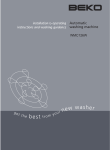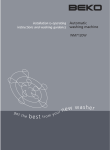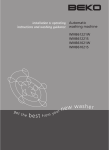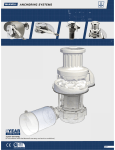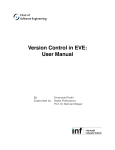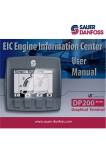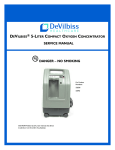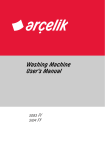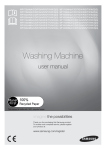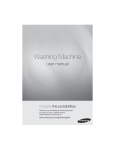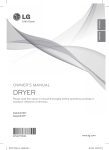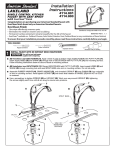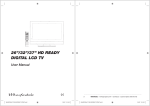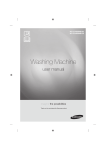Download Manual
Transcript
Please read this user manual first! Dear Customer, We hope that you get the best results from the product which has been manufactured in state-of-the-art plants and passed through a strict quality control procedure. Therefore, please read the entire user manual carefully before using the product and keep it as a reference for future use. In case of transferring the product to someone else, give the manual as well. The user manual will help you use your machine in a fast and safe way. between models will be identified in the manual. Explanation of symbols Throughout this user manual the following symbols are used: Important information or useful hints about usage. Warning for hazardous situations with regard to life and property. Warning for electric shock. This appliance’s packaging material is recyclable. Help recycle it and protect the environment by dropping it off in the municipal facility provided for this purpose. Your appliance also contains a great amount of recyclable material. It is marked with this label to indicate the used appliances that should not be mixed with other waste. This way, the appliance recycling organised by your manufacturer will be done under the best possible conditions, in compliance with European Directive 2002/96/EC on Waste Electrical and Electronic Equipment. Contact your town hall or your retailer for the used appliance collection points closest to your home. We thank you doing your part to protect the environment. 2 EN TABLE OF CONTENTS 1 Your washing machine 4 5 Operating the product Overview . . . . . . . . . . . . . . . . . . . . . . . . Technical specifications . . . . . . . . . . . . . 2 Important safety instructions Control panel. . . . . . . . . . . . . . . . . . . . Preparing the machine. . . . . . . . . . . . . Programme selection. . . . . . . . . . . . . . Main programmes . . . . . . . . . . . . . . . Temperature selection . . . . . . . . . . . . . 20 Spin speed selection . . . . . . . . . . . . . . 20 Programme selection and consumption table . . . . . . . . . . . . . . . . . . . . . . . . . . . . . . . . . . . . 22 Starting the programme. . . . . . . . . . . . 22 Child Lock . . . . . . . . . . . . . . . . . . . . . . 22 Progress of programme. . . . . . . . . . . . 23 Loading door lock . . . . . . . . . . . . . . . . 23 Changing the selections after programme has started . . . . . . . . . . . . . . . . . . . . . 23 Cancelling the programme . . . . . . . . . . End of programme . . . . . . . . . . . . . . . 6 General safety . . . . . . . . . . . . . . . . . . . . 6 Intended use . . . . . . . . . . . . . . . . . . . . . 6 Children's safety . . . . . . . . . . . . . . . . . . 3 Installation 8 . . . . . . .8 . . . .8 . . . . .8 Connecting water supply . . . . . . . . . . . . 9 Connecting to the drain . . . . . . . . . . . . . 9 ................. Electrical connection . . . . . . . . . . . . . . First use . . . . . . . . . . . . . . . . . . . . . . . Disposing of packaging material . . . . . Transportation of the product. . . . . . . . Disposing of the old product . . . . . . . . 4 Preparation 18 6 Maintenance and cleaning25 Cleaning the detergent drawer. . . . . . . Cleaning the loading door and the drum . . . . . . . . . . . . . . . . . . . . . . . . . . Cleaning the body and control panel . . Cleaning the water intake filters . . . . . . Draining remaining water and cleaning the pump filter . . . . . . . . . . . . . . . . . . . . . . 26 13 Things to be done for energy saving . . Sorting the laundry . . . . . . . . . . . . . . . Preparing laundry for washing . . . . . . . Correct load capacity . . . . . . . . . . . . . Loading the laundry . . . . . . . . . . . . . . . Using detergent and softener . . . . . . . Tips for efficient washing . . . . . . . . . . . 3 7 Troubleshooting 28 8 Guarantee 34 9 Service 35 EN 1 Your washing machine Overview 8 1 2 3 7 6 4 5 1PXFSDBCMF 2- Top panel 3- Control panel 'JMUFSDBQ "EKVTUBCMFGFFU 6- Loading door %FUFSHFOUESBXFS 8- Drain hose EN WM6110W 6 84 60 48 59 230V~ / 50Hz 10 2200 1100 1.00 0.25 2 Important safety instructions by a qualified electrician. Our company shall not be liable for any damages that will arise when the product is used without grounding in accordance with the local regulations. This section contains safety instructions that will help protect from risk of personal these instructions shall void any warranty. General safety This appliance is not intended for use by persons (including children) with reduced physical, sensory or mental capabilities, or lack of experience and knowledge, unless they have been given supervision or instruction concerning use of the appliance by a person responsible for their safety. Children should not play or tamper with the appliance.Cleaning and user maintenance should never be performed by children unless supervised by a responsible adult. Never place the product on a carpetcovered floor; otherwise, lack of airflow beneath the machine will cause electrical parts to overheat. This will cause problems with your product. Do not operate the product if the power cable / plug is damaged. Call the Authorised Service Agent. Ensure that the product is located close to and connected to an accessible properly earthed and fused mains socket outlet. must be securely fastened and remain undamaged. Otherwise, there is the risk of water leakage. the filter while there is still water in the drum. Otherwise, risk of flooding and door. The loading door will be ready washing cycle comes to an end. In case of forcing the loading door to open, the door and the lock mechanism may get damaged. or pouring water onto it! There is the risk of electric shock! Never unplug by pulling on the cable, always pull out by gripping the plug. supplements suitable for automatic washing machines only. tags and on the detergent package. installation, maintenance, cleaning and repairing procedures. be operated unless it is repaired by the Authorised Service Agent.There is the risk of electric shock! operating in the event of powering on after a power interruption. If you wish to cancel the programme, see "Cancelling the programme" section. repairing procedures carried out by authorised persons Manufacturer shall not be held liable for damages that may arise from procedures carried out by unauthorised persons. Intended use outlet protected by a fuse complying with the values in the "Technical specifications" table. Do not neglect to have the grounding installation made domestic use. It is not suitable for commercial use such use may invalidate the warranty. washing and rinsing of laundry that are marked accordingly. 6 EN t 5IFNBOVGBDUVSFSXBJWFTBOZ responsibility arisen from incorrect usage or transportation. Children's safety t &MFDUSJDBMQSPEVDUTBSFEBOHFSPVTGPS UIFDIJMESFO,FFQDIJMESFOBXBZGSPN the product when it is in use. Do not let them to tamper with the product. Use child lock to prevent children from intervening with the product. t %POPUGPSHFUUPDMPTFUIFMPBEJOH door when leaving the room where the product is located. t 4UPSFBMMEFUFSHFOUTBOEBEEJUJWFTJOB safe place away from the reach of the children. EN 3 Installation To make the product ready for use, review the information in the user manual and make sure that the electricity, tap water supply and water drainage systems are appropriate before installation. If they are not ,call a qualified technician and plumber to have any necessary arrangements carried out. Preparation of the location and electrical, tap water and waste water installations at the place of installation is the customer's responsibility. Installation and electrical connections of the product must be carried out by the a competent person. Manufacturer shall not be held liable for damages that may arise from procedures carried out by unauthorised persons. Prior to installation, visually check if the product has any defects on it. If so, do not have it installed. Damaged products cause risks for your safety. Make sure that the water inlet and discharge hoses as well as the power cable are not folded, pinched or crushed while pushing the product into its place after installation or cleaning procedures. Removing packaging reinforcement Tilt the machine backwards to remove packaging reinforcement by pulling the ribbon. Removing the transportation locks bolts before operating the washing machine, otherwise, the product will be damaged. they rotate freely (C). Appropriate installation location not place it on a long pile rug or similar surfaces. and the dryer -with full load- when they are placed on top of each other Place the product on a solid and flat floor that has sufficient load carrying capacity! turning them gently. cable. where temperature may fall below 0ºC. from the edges of other furniture. 8 EN 2. Tighten all hose nuts by hand. Never use a wrench when tightening the nuts. the User Manual bag into the holes on the rear panel. (P) a safe place to reuse when the washing machine needs to be moved again in the future. Never move the product without the transportation safety bolts properly fixed in place! Connecting water supply The water supply pressure required from the fully open tap in one minute to have your machine run smoothly. water pressure is higher. 3. Open the taps completely after making the hose connection to check for water leaks at the connection points. If any leaks occur, turn off the tap and Models with a single water inlet should not be connected to the hot water tap. In such a case the laundry will get damaged or the product will switch to protection mode and will not operate. Do not use old or used water inlet hoses on the new product. It may cause stains on your laundry. carefully after checking the seal. To prevent water leakages and damages caused by them, keep the taps closed when the machine is not in use. Connecting to the drain with the product to the water inlet directly connected to the wastewater drain or to the washbasin. Your house will be flooded if the hose comes out of its housing during water discharge. Moreover, there is risk of scalding due to high washing temperatures! To prevent such situations and to ensure smooth water intake and discharge of the machine, fix the end of the discharge hose tightly so that it cannot come out. most. 9 EN t *ODBTFUIFIPTFJTFMFWBUFEBGUFS laying it on the floor level or close to UIFHSPVOEMFTTUIBODNBCPWFUIF ground), water discharge becomes more difficult and the laundry may come out excessively wet. Therefore, follow the heights described in the figure. t 5PQSFWFOUGMPXJOHPGEJSUZXBUFSCBDL into the machine and to allow for easy discharge, do not immerse the hose end into the dirty water or drive it in the ESBJONPSFUIBODN*GJUJTUPPMPOH cut it short. t 5IFFOEPGUIFIPTFTIPVMEOPUCF bent, it should not be stepped on and the hose must not be pinched between the drain and the machine. t *GUIFMFOHUIPGUIFIPTFJTUPPTIPSU use it by adding an original extension hose. Length of the hose may not be longer than 3.2 m. To avoid water leak failures, the connection between the extension hose and the drain hose of the product must be fitted well with an appropriate clamp as not to come off and leak. Adjusting the feet order to ensure that the product A Inoperates more silent and vibration-free, it must stand level and balanced on its GFFU#BMBODFUIFNBDIJOFCZBEKVTUJOH the feet. Otherwise, the product may move from its place and cause crushing and vibration problems. -PPTFOUIFMPDLOVUTPOUIFGFFUCZ hand. "EKVTUUIFGFFUVOUJMUIFQSPEVDUTUBOET level and balanced. 3. Tighten all lock nuts again by hand. not use any tools to loosen the lock A Do nuts. Otherwise, they will get damaged. Electrical connection Connect the product to a grounded outlet protected by a fuse complying with the values in the "Technical specifications" table. Our company shall not be liable for any damages that will arise when the product is used without grounding in accordance with the local regulations. t $POOFDUJPONVTUDPNQMZXJUIOBUJPOBM regulations. t 1PXFSDBCMFQMVHNVTUCFXJUIJOFBTZ reach after installation. t 5IFWPMUBHFBOEBMMPXFEGVTFPS breaker protection are specified in the “Technical specifications” section. If the current value of the fuse or breaker in UIFIPVTFJTMFTTUIBO"NQTIBWF BRVBMJGJFEFMFDUSJDJBOJOTUBMMB"NQ EN fuse. your mains voltage. cables or multi-plugs. Damaged power cables must be 2 3 Electrical requirements Before you insert the plug into the wall socket make sure that the voltage and the frequency shown in the rating label corresponds to your electricity supply. We recommend that this appliance be connected to the mains supply via a suitable switched and fused socket in a readily accessible position. Should the mains lead of the appliance become damaged or need replacing at any time, it must be replaced by a special purpose made mains lead which can only (earth) wire to the terminal in the plug marked ‘E’ or with the symbol f or coloured green and yellow or green. Connect the blue (neutral) wire to the terminal in the plug marked ‘N’ or coloured black. Connect the brown (live) wire to the terminal in the plug marked ‘L’ or coloured red. be fitted either in the plug or adaptor or in the main fuse box. If in doubt contact a qualified electrician. This appliance must be earthed If the fitted moulded plug is not suitable for your socket, then the plug should be cut off and an appropriate plug fitted. Destroy the old plug, which is cut off as a plug with a bared cord could cause a shock hazard if inserted into a socket elsewhere in the house. The moulded plug on this appliance used. Do not forget to refit the fuse cover. In the event of losing the fuse cover, the plug must not be used until a replacement fuse cover has been fitted. Colour of the replacement fuse cover must be the same colour as that visible on the pin face of the plug. Fuse covers are available from any good electrical store. Important Fitting a different plug lead of this appliance may not correspond with the coloured markings identifying the terminals on your plug, proceed as follows: First use Before starting to use the product, make sure that all preparations are made in accordance with the instructions in sections "Important safety instructions" and "Installation". To prepare the product for washing laundry, first perform a Drum Cleaning programme. If your machine is not featured with Drum Cleaning programme, use Cottons-90 programme and select functions as well. Before starting the EN anti-limescale into the main wash detergent compartment (compartment nr. II). If the anti-limescale is in tablet form, put only one tablet into compartment nr. II. Dry the inside of the bellow with a clean piece of cloth after the programme has come to an end. Disposing of the old product Dispose of the old product in an environmentally friendly manner. 3FGFSUPZPVSMPDBMEFBMFSPSTPMJEXBTUF collection centre in your area to learn how to dispose of your product. For children's safety, cut the power cable and break the locking mechanism of the loading door so that it will be nonfunctional before disposing of the product. Use an anti-limescale suitable for the C washing machines. Some water might have remained in C the product due to the quality control processes in the production. It is not harmful for the product. Disposing of packaging material Packaging materials are dangerous to DIJMESFO,FFQQBDLBHJOHNBUFSJBMTJO a safe place away from reach of the children. Packaging materials of the product are manufactured from recyclable materials. Dispose of them properly and sort in accordance with recycled waste instructions. Do not dispose of them with normal domestic waste. Transportation of the product 6OQMVHUIFQSPEVDUCFGPSF transporting it. 3FNPWFXBUFSESBJOBOEXBUFSTVQQMZ connections. 3. Drain the remaining water in the product completely; see, "Draining remaining water and cleaning the pump filter". *OTUBMMUSBOTQPSUBUJPOTBGFUZCPMUT in the reverse order of removal QSPDFEVSFTFF3FNPWJOHUIF transportation locks". Never move the product without the transportation safety bolts properly fixed in place! C EN 4 Preparation Things to be done for energy saving Following information will help you use the product in an ecological and energyefficient manner. t 0QFSBUFUIFQSPEVDUJOUIFIJHIFTU capacity allowed by the programme you have selected, but do not overload; see, “Programme and consumption table”. t "MXBZTGPMMPXUIFJOTUSVDUJPOTPOUIF detergent packaging. t 8BTITMJHIUMZTPJMFEMBVOESZBUMPX temperatures. t 6TFGBTUFSQSPHSBNNFTGPSTNBMM quantities of lightly soiled laundry. t %POPUVTFQSFXBTIBOEIJHI temperatures for laundry that is not heavily soiled or stained. t *GZPVQMBOUPESZZPVSMBVOESZJOB dryer, select the highest spin speed recommended during washing process. t %POPUVTFEFUFSHFOUJOFYDFTTPG the amount recommended on the detergent package. Sorting the laundry t 4PSUMBVOESZBDDPSEJOHUPUZQFPG fabric, colour, and degree of soiling and allowable water temperature. t "MXBZTPCFZUIFJOTUSVDUJPOTHJWFOPO the garment tags. Washing water temperature Wash with sensitive, .short programmes Bleach can be used Do not use bleach Suitable for drier Do not dry with drier Hang without spinning Can be ironed with hot iron Non machine-washable Do not wash Dry-cleanable Do not dry-clean Dry horizontally Dry on a hanger Can be ironed with warm iron Do not iron Preparing laundry for washing t -BVOESZJUFNTXJUINFUBMBUUBDINFOUT such as, underwired bras, belt buckles or metal buttons will damage the NBDIJOF3FNPWFUIFNFUBMQJFDFTPS wash the clothes by putting them in a laundry bag or pillow case. EN and the washing programme desired. Take out all items in the pockets such as coins, pens and paper clips, and turn pockets inside out and brush. or cause noise problem. socks and nylon stockings in a laundry bag or pillow case. items. mend rips and tears. washable” labelled products only with an appropriate programme. together. New, dark coloured cottons release a lot of dye. Wash them separately. amount of water according to the weight of the loaded laundry. Follow the information in the “Programme and consumption table”. When overloaded, machine’s washing performance will drop. Moreover, noise and vibration problems may occur. Laundry types and their average weights in the following table are given as examples. Laundry type Bathrobe Napkin Duvet cover Bed Sheet Pillowcase Tablecloth Towel Hand towel Evening gown Underclothing Men’s overalls Men’s shirt Weight (g) 200 200 200 600 200 Blouses Loading the laundry before washing. If unsure, check with a dry cleaner. machine. and limescale removers suitable for hear a locking sound. Ensure that no items are caught in the door. The loading door is locked while a programme is running. The door can only be opened a while after the programme comes to an end. In case of misplacing the laundry, noise and vibration problems may occur in the machine. instructions on the package. turned inside out. wool in the freezer for a few hours before washing. This will reduce pilling. such as flour, lime dust, milk powder, etc. intensely must be shaken off before placing into the machine. Such dusts and powders on the laundry may build up on the inner parts of the machine in time and can cause damage. Correct load capacity The maximum load capacity depends on the type of laundry, the degree of soiling EN Using detergent and softener and quilts, it is recommended to use Detergent Drawer liquid detergent. The detergent drawer is composed of three Wash woollens with special detergent compartments: made specifically for woollens. - (I) for pre-wash Use only detergents manufactured - (II) for main wash specifically for washing machines. - (III) for softener Do not use soap powder. for softener, in addition there is a siphon Adjusting detergent amount in softener compartment The amount of washing detergent to be used depends on the amount of laundry, the degree of soiling and water hardness. II III I the detergent package carefully and follow the dosage values. dosage quantities recommended on the detergent package to avoid problems of excessive foam, poor rinsing, financial savings and finally, environmental protection. Detergent, softener and other cleaning agents starting the washing programme. the washing programme is running! prewash, do not put any detergent into the prewash compartment (compartment nr. I). or lightly soiled clothes. recommended dosage. Using softeners Pour the softener into the softener compartment of the detergent drawer. package. marking in the softener compartment. put liquid detergent into the prewash compartment (compartment nr. I). prewash if you are using a detergent bag or dispensing ball. Place the detergent bag or the dispensing ball directly among the laundry in the machine. it with water before putting it in the detergent drawer. Using liquid detergents If the product contains a liquid detergent cup: liquid detergent cup in compartment nr. “II”. not forget to place the liquid detergent cup into the main wash compartment (compartment nr. II). Choosing the detergent type The type of detergent to be used depends on the type and colour of the fabric. measuring cup and follow the instructions on the package. package. and white laundry. dilute it with water before putting in the detergent cup. special detergents (liquid detergent, wool shampoo, etc.) used solely for delicate clothes. EN detergent between the laundry, close to the lower part of the drum in future washings. Use the tablet or gel detergent without selecting the prewash function. Using starch t "EEMJRVJETUBSDIQPXEFSTUBSDIPSUIF dyestuff into the softener compartment as instructed on the package. t %POPUVTFTPGUFOFSBOETUBSDI together in a washing cycle. t 8JQFUIFJOTJEFPGUIFNBDIJOFXJUI a damp and clean cloth after using starch. Using bleaches t 4FMFDUBQSPHSBNNFXJUIQSFXBTI and add the bleaching agent at the beginning of the prewash. Do not put detergent in the prewash compartment. "TBOBMUFSOBUJWFBQQMJDBUJPOTFMFDUB programme with extra rinse and add the bleaching agent while the machine is taking water from the detergent compartment during first rinsing step. t %POPUVTFCMFBDIJOHBHFOUBOE detergent by mixing them. t 6TFKVTUBMJUUMFBNPVOUBQQSPY ml) of bleaching agent and rinse the clothes very well as it causes skin irritation. Do not pour the bleaching agent onto the clothes and do not use it for coloured clothes. t 8IFOVTJOHPYZHFOCBTFECMFBDIFT follow the instructions on the package and select a programme that washes at a lower temperature. t 0YZHFOCBTFECMFBDIFTDBOCFVTFE together with detergents; however, if its thickness is not the same with the detergent, put the detergent first into the compartment nr. “II” in the detergent drawer and wait until the detergent flows while the machine JTUBLJOHJOXBUFS"EEUIFCMFBDIJOH agent from the same compartment while the machine is still taking in water. Using limescale remover t 8IFOSFRVJSFEVTFMJNFTDBMFSFNPWFST manufactured specifically for washing machines only. t "MXBZTGPMMPXJOTUSVDUJPOTPOUIF package. C If the product does not contain a liquid detergent cup: t %POPUVTFMJRVJEEFUFSHFOUGPSUIF prewash in a programme with prewash. t 6TFUIFEFUFSHFOUNBOVGBDUVSFST measuring cup and follow the instructions on the package. t -JRVJEEFUFSHFOUTUBJOTZPVSDMPUIFT when used with Delayed Start function. If you are going to use the Delayed Start function, do not use liquid detergent. Using gel and tablet detergent When using tablet, gel, etc. detergents, read the manufacturer’s instructions on the detergent package carefully and follow the dosage values. If there is not any instruction on the package, apply the following. t *GUIFHFMEFUFSHFOUUIJDLOFTTJTGMVJEBM and your machine does not contain a special liquid detergent cup, put the gel detergent into the main wash detergent compartment during first water intake. If your machine contains a liquid detergent cup, fill the detergent into this cup before starting the programme. t *GUIFHFMEFUFSHFOUUIJDLOFTTJTOPU fluidal or in the shape of capsule liquid tablet, put it directly into the drum before washing. t 1VUUBCMFUEFUFSHFOUTJOUPUIFNBJO wash compartment (compartment nr. II) or directly into the drum before washing. Tablet detergents may leave residues in the detergent compartment. If you encounter such a case, place the tablet C EN Tips for efficient washing Clothes Light colours and whites Heavily Soiled Soiling Level (difficult stains such as grass, coffee, fruits and blood.) Colors Dark colors Delicates/ Woolens/Silks (Recommended temperature range based on soiling level: 40-90C) (Recommended temperature range based on soiling level: cold-40C) (Recommended temperature range based on soiling level: cold-40C) (Recommended temperature range based on soiling level: cold-30C) It may be necessary to pretreat the stains of perform prewash. Powder and liquid detergents recommended for whites can be used at dosages recommended for heavily soiled clothes. It is recommended to use powder detergents to clean clay and soil stains and the stains that are sensitive to bleaches. Powder and liquid detergents recommended for colours can be used at dosages recommended for heavily soiled clothes. It is recommended to use powder detergents to clean clay and soil stains and the stains that are sensitive to bleaches. Use detergents without bleach. Liquid detergents suitable for colours and dark colours can be used at dosages recommended for heavily soiled clothes. Prefer liquid detergents produced for delicate clothes. Woollen and silk clothes must be washed with special woollen detergents. Powder and liquid detergents recommended for colours can be used at dosages recommended for normally soiled clothes. Use detergents without bleach. Liquid detergents suitable for colours and dark colours can be used at dosages recommended for normally soiled clothes. Prefer liquid detergents produced for delicate clothes. Woollen and silk clothes must be washed with special woollen detergents. Powder and liquid detergents recommended for colours can be used at dosages recommended for lightly soiled clothes. Use detergents without bleach. Liquid detergents suitable for colours and dark colours can be used at dosages recommended for lightly soiled clothes. Prefer liquid detergents produced for delicate clothes. Woollen and silk clothes must be washed with special woollen detergents. Normally Soiled Powder and liquid detergents recommended (For example, for whites can be stains caused used at dosages by body on recommended for collars and normally soiled cuffs) clothes. Lightly Soiled (No visible stains exist.) Powder and liquid detergents recommended for whites can be used at dosages recommended for lightly soiled clothes. EN 7 6 4 8 5 2 1 Preparing the machine connected tightly. 2. Plug in your machine. 3. Turn the tap on completely. Programme selection the type, quantity and soiling degree of the laundry in accordance with the "Programme and consumption table" and the temperature table below. 90˚C 60˚C 30˚CCold Heavily soiled white cottons and linens. (coffee table covers, tableclothes, towels, bed sheets, etc.) Normally soiled, coloured, fade proof cottons or synthetic clothes (shirt, pyjamas and lightly soiled white linens (underwear, etc.) Blended laundry including delicate textile (net curtains, etc.), synthetics and woollens. 2. Select the desired programme with the Programme Selection button. Programmes are limited with the highest spin speed appropriate for that particular type of fabric. When selecting a programme, always consider the type of fabric, colour, degree of soiling and permissible water temperature. temperature. Higher temperature means higher power consumption. For further programme details, see "Programme and consumption table". Main programmes Depending on the type of fabric, use the following main programmes. You may wash your normally soiled durable cotton and linen laundry in this programme with the highest energy and water saving compared to all other wash water temperature may differ from the declared cycle temperature. Programme duration may automatically be shortened during later stages of the programme if you wash less amount (e.g. ½ capacity or less) of laundry. In this case energy and water consumption will be further decreased giving you the opportunity for a more economical wash. This feature is available for certain models having remaining time display. Use this programme to wash your synthetic clothes (shirts, blouses, synthetic/cotton blends, etc.). It washes with a gentle action and has a shorter washing cycle compared to the Cottons programme. For curtains and tulle, use the Synthetic excessive foaming, wash the nets/tulle by putting little amount of detergent into the main wash compartment. Do not put detergent in the prewash compartment. Use this programme to wash your woollen clothes. Select the appropriate temperature complying with the tags of your clothes. Use appropriate detergents for woollens. Additional programmes For special cases, additional programmes are available in the machine. according to the model of the machine. Use this programme to wash your delicate clothes. It washes with a gentle action without any interim spin compared to the Synthetics programme. Use this programme to wash your woollen/ delicate clothes that bear “not machinewashable” tags and for which hand wash is recommended. It washes laundry with a very gentle washing action to not to damage clothes. Use this programme to wash your little amount of lightly soiled cotton clothes in a short time (30 minutes). Use this programme to wash your laundry for which you cannot use Cottons 60 °C EN programme. It gives the same result with the Cottons 60 °C programme by washing energy saving. Special programmes For specific applications, select any of the following programmes. Use this programme when you want to rinse or starch separately. Use this programme to apply an additional spin cycle for your laundry or to drain the water in the machine. Before selecting this programme, select the desired spin speed and press Start / Pause / Cancel button. First, the machine will drain the water inside of it. Then, it will spin the laundry with the set spin speed and drain the water coming out of them. If you wish to drain water only without spinning your laundry, select the Spin + Drain programme and then select the "No Spin" function with the help of Spin the model of your machine and press Start / Pause button. If your machine is not equipped No Spin auxiliary function and if you wish to drain the water only without spinning your laundry, select the Spin + Drain programme and press Start / Pause button. Machine will switch to spin step once it completes pump step. Press Start / Pause / Cancel button to stop the machine as soon as you see the drum rotating. Use a lower spin speed for delicate laundries. Spin speed selection In models equipped with Spin Speed laundry at the desired speed by using this button. In models not equipped with Spin Speed at the recommended speed for the selected programme. If you wish to take out your laundry without spinning, switch the Spin position. 20 EN No Heat 1.65 1.01 0.86 0.62 1.33 0.16 0.81 0.92 0.56 0.30 0.15 0.36 0.36 0.02 0.21 0.17 No Spin 53 52 48 48 53 53 53 52 52 52 52 45 45 45 32 43 Spin speed reduction 125 148 148 132 105 95 160 113 125 95 90 65 60 50 45 30 Rinse Hold Energy Consumption (kWh) Prewash 6 6 3 3 6 6 6 2.5 2.5 2.5 2.5 2 1.5 1.5 1 2.5 Extra Rinse Water Consumption (l) 90 60 60** 40 40 Cold 40 60 40 30 Cold 30 40 Cold 30 30 Programme Duration (~min) Cottons Cottons Cottons Cottons Cottons Cottons A Class 40 Synthetics Synthetics Synthetics Synthetics Delicates 30 Woollens Woollens Hand Wash Mini 30' Max. Load (kg) Programme • : Selectable * : Automatically selected, no canceling. ** : Energy Label programme (EN 60456 Ed.3) *** : If maximum spin speed of the machine is lower then this value, you can only select up to the maximum spin speed. ** “Cotton eco 40°C and Cotton eco 60°C are standard cycles.” These cycles are known as ‘40°C cotton standard cycle’ and ‘60°C cotton standard cycle’ and indicated with the symbols on the panel. The auxiliary functions in the table may vary according to the model of your machine. Water and power consumption may vary subject to the changes in water pressure, water hardness and temperature, ambient temperature, type and amount of laundry, selection of auxiliary functions and spin speed, and changes in electric voltage. You can see the washing time of the programme you have selected on the display of the machine. It is normal that small differences may occur between the time shown on the display and the real washing time. Auxiliary function selection In models equipped with Spin Speed Select the desired auxiliary functions before starting the programme. Furthermore, you can also select or cancel auxiliary functions that are suitable to the running programme without pressing the Start / Pause / Cancel button when the machine is operating. For this, the machine must be in a step before the auxiliary function you are going to select or cancel. If the auxiliary function cannot be selected or cancelled, light of the relevant auxiliary function will blink 3 times to warn the user. Some functions cannot be selected together. If a second auxiliary function conflicting with the first one is selected before starting the machine, the function selected first will be canceled and the second auxiliary function selection will remain active. compatible with the programme cannot be selected. (See "Programme and consumption table") according to the model of the machine. and press Start / Pause / Cancel button if you want to spin the laundry held in water. In models not equipped with Spin Speed Adjustment button, select Spin+Drain programme if you want to spin your laundry held in water. In these models, you need to stop the machine by pressing Start / Pause / Cancel button before switching to spin step and after drain step is completed and the water in the machine is drained. Thus, water inside the machine is drained and your laundry is not spun. Use this function if you want to wash your laundry in cold water. Use this function if you do not want your clothes be spun at the end of the programme. This function allows spinning of laundry at a speed lower than the maximum spin speed of the machine. spin speed will be limited to the minimum speed specified on the control panel. soiled laundry. Not using the Prewash will save energy, water, detergent and time. excessive foaming, wash the nets/tulle by putting little amount of detergent into the main wash compartment. Do not put detergent in the prewash compartment. This function enables the machine to make another rinsing in addition to the one already made after the main wash. Thus, the risk for sensitive skins (babies, allergic skins, etc.) to be effected by the minimal detergent remnants on the laundry can be reduced. If you are not going to unload your clothes immediately after the programme completes, you can use rinse hold function to keep your laundry in the final rinsing water in order to prevent them from getting wrinkled when there is no water in the machine. 22 Starting the programme start the programme. 2. Start / Pause / Cancel button lights up to indicate that the programme has started. 3. Loading door is locked and Loading Door light turns off. Child Lock Use Child Lock function to prevent children from tampering with the machine. Thus you can avoid any changes in a running programme. You can switch on and off the machine with On / Off button when the Child Lock is active. When you switch on the machine again, programme will resume from where it has stopped with the child lock enabled. To activate the Child Lock: st and 2nd Function buttons for 3 seconds EN simultaneously after washing programme Even if you select a new programme by changing the position of the light flashes continuously. Programme Selection knob while the To deactivate the Child Lock: machine is running or in Pause mode, Child lock must be deactivated to start a the programme selected first will new programme after the programme has continue. You must cancel the current finished or to interrupt a running programme. programme to change the washing st and 2nd programme. See "Cancelling the Function buttons for 3 seconds programme". simultaneously to disable child lock. Changing the auxiliary function, speed and temperature Progress of programme Depending on the step the programme has Progress of a running programme can reached, you may cancel or activate the be followed from the Programme Followprogramme step, the relevant indicator light will turn on and light of the completed step will turn off. To change the auxiliary function, speed and temperature settings while a programme is running, you need to switch the machine to Pause mode. Press Start / Pause / Cancel button to switch the machine into Pause mode. In this case, Start / Pause / Cancel light flashes. If the machine does not pass to the might be active or the automatic unbalanced load detection system might be activated due to the unbalanced distribution of the laundry in the machine. Loading door lock There is a locking system on the loading door of the machine that prevents opening of the door in cases when the water level is unsuitable. When machine is switched to Pause mode, it checks the level of the water inside. If the level is suitable, Loading Door light selection". You can also change the speed and temperature settings; see, "Spin speed selection" and "Temperature selection". Adding or taking out laundry switch the machine to pause mode. 2. Wait until the Loading Door can be opened. If the Loading Door light does not the water level in the machine is not suitable and laundry cannot be added. You can resume the programme by pressing Start / Pause / Cancel button. 3. Open the Loading Door and add or take out the laundry. temperature and speed settings if necessary. 6. Press Start / Pause / Cancel button to start the machine. the loading door can be opened. If the Loading Door light is not on, Loading Door cannot be opened. If you are obliged to open the Loading Door while the Loading Door light is off, you must cancel the current programme; see "Cancelling the programme". Changing the selections after programme has started To change your settings after the programme has started, you have to switch the machine to Pause mode first. 23 EN Cancelling the programme Press and hold Start / Pause / Cancel button for 3 seconds to cancel the current machine can drain the water inside it or can take in and drain water up to 3 times to cool down the laundry. Washing and End lights turn on. Once draining is complete, Start / Pause / Cancel and Washing lights turn off, and Loading Door light starts flashing. When the Loading Door is unlatched, Loading Door light turns on and remains lit. In this case, you can select and start the new programme. End of programme End light in the programme follow-up indicator will light up once the programme comes to an end. machine. 2. Take out your laundry and close the loading door. Your machine is ready for the next washing cycle. EN 6 Maintenance and cleaning Service life of the product extends and frequently faced problems decrease if cleaned at regular intervals. inside of the bellow with a clean piece of cloth after the programme has come to an end. Cleaning the detergent drawer 2 months. Use an anti-limescale suitable for the washing machines. Clean the detergent drawer at regular as shown below in order to prevent accumulation of powder detergent in time. in the softener compartment and pull towards you until the compartment is removed from the machine. If more than normal amount of water and softener mixture starts to gather in the softener compartment, the siphon must be cleaned. 2. Wash the detergent drawer and the siphon with plenty of lukewarm water in a washbasin. Wear protective gloves or use an appropriate brush to avoid touching of the residues in the drawer with your skin when cleaning. 3. Insert the drawer back into its place after cleaning and make sure that it is seated well. Cleaning the loading door and the drum may accumulate in your machine in time and may cause unpleasant odours and washing complaints. To avoid this, use the Drum Cleaning programme. If your machine is not featured with Drum Cleaning programme, use Cottons-90 programme auxiliary functions as well. Before starting the programme,put max.100 g of antilimescale powder into the main wash detergent compartment (compartment nr. II). If the anti-limescale is in tablet form, put only one tablet into compartment nr. II. Dry the foreign substance is left in the drum. If the holes on the bellow shown in the figure is blocked, open the holes using a toothpick. Foreign metal substances in your machine will cause rust stains. Clean the stains on the drum surface by using cleaning agents for stainless steel. Never use steel wool or wire wool. Cleaning the body and control panel Wipe the body of the machine with soapy water or non-corrosive mild gel detergents as necessary, and dry with a soft cloth. Use only a soft and damp cloth to clean the control panel. Never use sponge or scrub materials. These will damage the painted and plastic surfaces. $ Cleaning the water intake filters There is a filter at the end of each water intake valve at the rear of the machine and also at the end of each water intake hose where they are connected to the tap. These filters prevent foreign substances and dirt in the water to enter the washing machine. Filters should be cleaned as they do get dirty. EN the water in the machine cools down. 2. Open the filter cap. If the filter cap is composed of two pieces, press the tab on the filter cap downwards and pull the piece out towards yourself. $MPTFUIFUBQT 3FNPWFUIFOVUTPGUIFXBUFSJOUBLF hoses to access the filters on the water intake valves. Clean them with an appropriate brush. If the filters are too dirty, take them out by means of pliers and clean them. 3. Take out the filters on the flat ends of the water intake hoses together with the gaskets and clean thoroughly under running water. 3FQMBDFUIFHBTLFUTBOEGJMUFSTDBSFGVMMZ in their places and tighten the hose nuts by hand. Draining remaining water and cleaning the pump filter The filter system in your machine prevents solid items such as buttons, coins and fabric fibers clogging the pump impeller during discharge of washing water. Thus, the water will be discharged without any problem and the service life of the pump will extend. If the machine fails to drain water, the pump filter is clogged. Filter must be cleaned whenever it is clogged or in every 3 months. Water must be drained off first to clean the pump filter. In addition, prior to transporting the machine (eg., when moving to another house) and in case of freezing of the water, water may have to be drained completely. Foreign substances left in the pump filter may damage your machine or may cause noise problem. In order to clean the dirty filter and discharge the water: 6OQMVHUIFNBDIJOFUPDVUPGGUIF supply power. Temperature of the water inside the machine may rise up to 90 ºC. To avoid burning risk, filter must be cleaned after If the filter cap is one piece, pull the cap from both sides at the top to open. You can remove the filter cover by C slightly pushing downwards with a thin plastic tipped tool, through the gap above the filter cover. Do not use metal tipped tools to remove the cover. 3. Some of our products have emergency draining hose and some does not have. Follow the steps below to discharge the water. Discharging the water when the product has an emergency draining hose: A A 26 a. Pull the emergency draining hose out from its seat b. Place a large container at the end of the hose. Drain the water into the container by pulling out the plug at the end of the hose. When the container is full, block the inlet of the hose by SFQMBDJOHUIFQMVH"GUFSUIFDPOUBJOFS EN is emptied, repeat the above procedure to drain the water in the machine completely. c. When draining of water is finished, close the end by the plug again and fix the hose in its place. d. Turn the pump filter to take it out. Discharging the water when the product does not have an emergency draining hose: a. Place a large container in front of the filter to catch water from the filter. b. Loosen pump filter (anticlockwise) until water starts to flow. Fill the flowing water into the container you have QMBDFEJOGSPOUPGUIFGJMUFS"MXBZTLFFQ a piece of cloth handy to absorb any spilled water. c. When the water inside the machine is finished, take out the filter completely by turning it. $MFBOBOZSFTJEVFTJOTJEFUIFGJMUFSBT well as fibers, if any, around the pump impeller region. *OTUBMMUIFGJMUFS *GZPVSQSPEVDUIBTBXBUFSKFUGFBUVSF be sure to fit the filter into its housing in the pump. Never force the filter while installing it into its housing. Seat the filter into its place completely. Otherwise, water may leak from the filter cap. 6. If the filter cap is composed of two pieces, close the filter cap by pressing on the tab. If it is one piece, seat the tabs in the lower part into their places first, and then press the upper part to close. A EN 7 Troubleshooting Programme cannot be started or selected. Press and hold Start / Pause / Cancel button for 3 seconds to reset the machine to factory settings. (See "Cancelling the programme") Water in the machine. This is not a failure; water is not harmful to the machine. There is water leaking from the bottom of the washing machine. Be sure the seals of the water inlet hoses are securely fitted. Attach the hose to the tap tightly. Make sure that the pump filter is completely closed. Machine does not fill with water. Open the inlet water taps fully. Flatten the water inlet hose. Clean the water inlet filter. Close the Loading Door. Machine does not drain water. Clean or flatten the hose. Clean the pump filter. Machine vibrates or makes noise. Adjust the feet to level the machine. Clean the pump filter. Remove the transportation safety bolts. Add more laundry to the machine. Take out some of the laundry from the machine or distribute the load by hand to balance it homogenously in the machine. Make sure that the machine is not leaning on anything. Machine stopped shortly after the programme started. It will resume running when the voltage restores to the normal level. Machine directly discharges the water it takes in. Connect the water draining hose as described in the operation manual. No water can be seen in the machine during washing. The water level is not visible from outside of the washing machine. This is not a failure. 28 EN Loading door cannot be opened. t %PPSMPDLJTBDUJWBUFECFDBVTFPGUIFXBUFSMFWFMJOUIFNBDIJOFDrain the water by running the Pump or Spin programme. t .BDIJOFJTIFBUJOHVQUIFXBUFSPSJUJTBUUIFTQJOOJOHDZDMFWait until the programme completes. t $IJMEMPDLJTFOHBHFE%PPSMPDLXJMMCFEFBDUJWBUFEBDPVQMFPGNJOVUFTBGUFS UIFQSPHSBNNFIBTDPNFUPBOFOEWait for a couple of minutes for deactivation of the door lock. Washing takes longer time than the one specified in the manual. t 8BUFSQSFTTVSFJTMPXMachine waits until taking in adequate amount of water to prevent poor washing quality due to the decreased amount of water. Therefore, the washing time extends. t 7PMUBHFNJHIUCFMPXWashing time is prolonged to avoid poor washing results when the supply voltage is low. t *OQVUUFNQFSBUVSFPGXBUFSNJHIUCFMPXRequired time to heat up the water extends in cold seasons. Also, washing time can be lengthened to avoid poor washing results. t /VNCFSPGSJOTFTBOEPSBNPVOUPGSJOTFXBUFSNJHIUIBWFJODSFBTFE Machine increases the amount of rinse water when good rinsing is needed and adds an extra rinsing step if necessary. t &YDFTTJWFGPBNNJHIUIBWFPDDVSSFEBOEBVUPNBUJDGPBNBCTPSQUJPOTZTUFN NJHIUIBWFCFFOBDUJWBUFEEVFUPUPPNVDIEFUFSHFOUVTBHFUse recommended amount of detergent. Machine does not switch to spinning step when the laundry is not evenly distributed in the drum to prevent any damage to the machine and to its surrounding environment. Laundry should be rearranged and re-spun. Programme time does not countdown. (On models with display) t 5JNFSNBZTUPQEVSJOHXBUFSJOUBLFTimer indicator will not countdown until the machine takes in adequate amount of water. The machine will wait until there is sufficient amount of water to avoid poor washing results due to lack of water. Timer indicator will resume countdown after this. t 5JNFSNBZTUPQEVSJOHIFBUJOHTUFQTimer indicator will not countdown until the machine reaches the selected temperature. t 5JNFSNBZTUPQEVSJOHTQJOOJOHTUFQAutomatic unbalanced load detection system might be activated due to the unbalanced distribution of the laundry in the drum. Machine does not switch to spinning step when the laundry is not evenly distributed in the drum to prevent any damage to the machine and to its surrounding environment. Laundry should be rearranged and re-spun. Programme time does not countdown. t 5IFSFNJHIUCFBOJNCBMBODFPGMBVOESZJOUIFNBDIJOFAutomatic unbalanced load detection system might be activated due to the unbalanced distribution of the laundry in the drum. Machine does not switch to spinning step when the laundry is not evenly distributed in the drum to prevent any damage to the machine and to its surrounding environment. Laundry should be rearranged and re-spun. C C C 29 EN Machine does not switch to spinning step. Automatic unbalanced load detection system might be activated due to the unbalanced distribution of the laundry in the drum. Machine does not switch to spinning step when the laundry is not evenly distributed in the drum to prevent any damage to the machine and to its surrounding environment. Laundry should be rearranged and re-spun. Check the filter and the draining hose. Use recommended amount of detergent. Washing performance is poor: Laundry turns grey. Use the recommended amount of detergent appropriate for water hardness and the laundry. Select the proper temperature for the laundry to be washed. Using insufficient amount of detergent with hard water causes the soil to stick on the cloth and this turns the cloth into grey in time. It is difficult to eliminate greying once it happens. Use the recommended amount of detergent appropriate for water hardness and the laundry. Use the recommended amount of detergent appropriate for water hardness and the laundry. Clean the drum regularly. For this, please see "Cleaning the loading door and the drum". Washing performance is poor: Stains persist or the laundry is not whitened. Use recommended amount of detergent appropriate for the laundry. Do not load the machine in excess. Load with amounts recommended in the "Programme and consumption table". Select the proper programme and temperature for the laundry to be washed. Use original detergent appropriate for the machine. Put the detergent in the correct compartment. Do not mix the bleaching agent and the detergent with each other. Clean the drum regularly. For this, please see "Cleaning the loading door and the drum". Washing performance is poor: Oily stains appeared on the laundry. Clean the drum regularly. For this, please see "Cleaning the loading door and the drum". Washing performance is poor: Clothes smell unpleasantly. Leave the detergent drawer as well as the loading door of the machine ajar after each washing. Thus, a humid environment favorable for bacteria cannot occur in the machine. Clean the drum regularly. For this, please see "Cleaning the loading door and the drum". 30 EN Colour of the clothes faded. t &YDFTTJWFMBVOESZXBTMPBEFEJODo not load the machine in excess. t %FUFSHFOUJOVTFJTEBNQKeep detergents closed in an environment free of humidity and do not expose them to excessive temperatures. t "IJHIFSUFNQFSBUVSFJTTFMFDUFESelect the proper programme and temperature according to the type and soiling degree of the laundry. t 3FHVMBSESVNDMFBOJOHJTOPUBQQMJFEClean the drum regularly. For this, please see "Cleaning the loading door and the drum". It does not rinse well. t 5IFBNPVOUCSBOEBOETUPSBHFDPOEJUJPOTPGUIFEFUFSHFOUVTFEBSF JOBQQSPQSJBUFUse a detergent appropriate for the washing machine and your laundry. Keep detergents closed in an environment free of humidity and do not expose them to excessive temperatures. t %FUFSHFOUJTQVUJOUIFXSPOHDPNQBSUNFOUIf detergent is put in the prewash compartment although prewash cycle is not selected, machine can take this detergent during rinsing or softener step. Put the detergent in the correct compartment. t 1VNQGJMUFSJTDMPHHFECheck the filter. t %SBJOIPTFJTGPMEFECheck the drain hose. Laundry became stiff after washing. t *OTVGGJDJFOUBNPVOUPGEFUFSHFOUJTVTFEUsing insufficient amount of detergent for the water hardness can cause the laundry to become stiff in time. Use appropriate amount of detergent according to the water hardness. t %FUFSHFOUJTQVUJOUIFXSPOHDPNQBSUNFOUIf detergent is put in the prewash compartment although prewash cycle is not selected, machine can take this detergent during rinsing or softener step. Put the detergent in the correct compartment. t %FUFSHFOUNJHIUCFNJYFEXJUIUIFTPGUFOFSDo not mix the softener with detergent. Wash and clean the dispenser with hot water. t 3FHVMBSESVNDMFBOJOHJTOPUBQQMJFEClean the drum regularly. For this, please see "Cleaning the loading door and the drum". Laundry does not smell like the softener. t %FUFSHFOUJTQVUJOUIFXSPOHDPNQBSUNFOUIf detergent is put in the prewash compartment although prewash cycle is not selected, machine can take this detergent during rinsing or softener step. Wash and clean the dispenser with hot water. Put the detergent in the correct compartment. t %FUFSHFOUNJHIUCFNJYFEXJUIUIFTPGUFOFSDo not mix the softener with detergent. Wash and clean the dispenser with hot water. t 3FHVMBSESVNDMFBOJOHJTOPUBQQMJFEClean the drum regularly. For this, please see "Cleaning the loading door and the drum". EN Detergent residue in the detergent drawer. Dry the detergent drawer before putting in detergent. Keep detergents closed in an environment free of humidity and do not expose them to excessive temperatures. Check the water pressure. Check the holes and clean if they are clogged. Call the Authorised Service Agent. Do not mix the softener with detergent. Wash and clean the dispenser with hot water. Clean the drum regularly. For this, please see "Cleaning the loading door and the drum". There is detergent left on the laundry. Do not load the machine in excess. Select the proper programme and temperature for the laundry to be washed. Select the proper detergent for the laundry to be washed. Clean the drum regularly. For this, please see "Cleaning the loading door and the drum". Too much foam forms in the machine. Use detergents appropriate for the washing machine. Use only sufficient amount of detergent. Store detergent in a closed and dry location. Do not store in excessively hot places. Use smaller amounts of detergent for this type of item. Put the detergent in the correct compartment. There may be problem in the valves or in the detergent dispenser. Call the Authorised Service Agent. Clean the drum regularly. For this, please see "Cleaning the loading door and the drum". Foam is overflowing from the detergent drawer. Mix 1 tablespoonful softener and ½ l water and pour into the main wash compartment of the detergent drawer. Put detergent into the machine suitable for the programmes and maximum loads indicated in the “Programme and consumption table”. When you use additional chemicals (stain removers, bleaches and etc), reduce the amount of detergent. Laundry remains wet at the end of the programme Use recommended amount of detergent. Machine does not switch to spinning step when the laundry is not evenly distributed in the drum to prevent any damage to the machine and to its surrounding environment. Laundry should be rearranged and re-spun. If you cannot eliminate the problem although you follow the instructions in this section, consult your dealer or the Authorised Service Agent. Never try to repair a nonfunctional product yourself. 8 Guarantee Booklet provided. Your new Beko product is guaranteed against the cost of breakdown repairs for twelve months from the date of the original purchase. is recommended for all Washing Machines, Dishwashers and Electric Cookers What is covered? a Gas Safe (or BORD GAIS) registered Gas Installer. materials, defective components or manufacturing defect. parts, but excluding consumable items. new products and is not transferable if the product is resold. repairer to carry out the repair. What is not covered? incidental or consequential damages. or misuse and abuse. including knobs, flaps, handles or container lids. including but not limited to, ice trays, scrapers, cutlery baskets, filters and light bulbs. diminish your statutory or legal rights. Should you experience any difficulty in obtaining service please contact the Beko Customer Help-Line. e-mail:[email protected] unauthorised repair or inexpert installation that fails to meet the requirements contained in the user instruction book. commercial or non-residential household premises. fridge/freezers. (Food loss insurance is often included within your household contents insurance policy, or may be available separately from your retailer). Important notes. built for domestic household use only. product is installed or used in commercial or non-residential domestic household premises. installed, located and operated in accordance with the instructions contained in the User Instructions EN 9 Service Please keep your purchase receipt or other proof of purchase in a safe place; you will need to have it should the product require attention under guarantee. You should also complete the details below; it will help us assist you when requesting service. (The model number is printed on the Instruction Booklet and UIFTFSJBMOVNCFSJTQSJOUFEPOUIF3BUJOH Label affixed to the appliance) service can be obtained at a charge. Should you experience any difficulty in obtaining service please contact the Beko Customer Help-Line. 5FM e-mail:[email protected] Model No: Serial No: 3FUBJMFS Date of purchase: For service under guarantee simply telephone the appropriate number below UK Mainland & Northern Ireland 'SJEHFT'SFF[FST &MFDUSJD$PPLFST (BT Dual Fuel Cookers 8BTIJOH.BDIJOFT Dishwashers Republic of Ireland "MM3FGSJHFSBUJPO "MM$PPLFST Washing Machines & Dishwashers Before requesting service please check the trouble-shooting guide in the Operating Instructions as a charge may be levied where no fault is found even though your product may still be under guarantee. Service once the manufacturers guarantee has expired. If you have purchased an extended guarantee please refer to the instructions contained within the extended guarantee agreement document. Otherwise please call the appropriate number above where EN




































